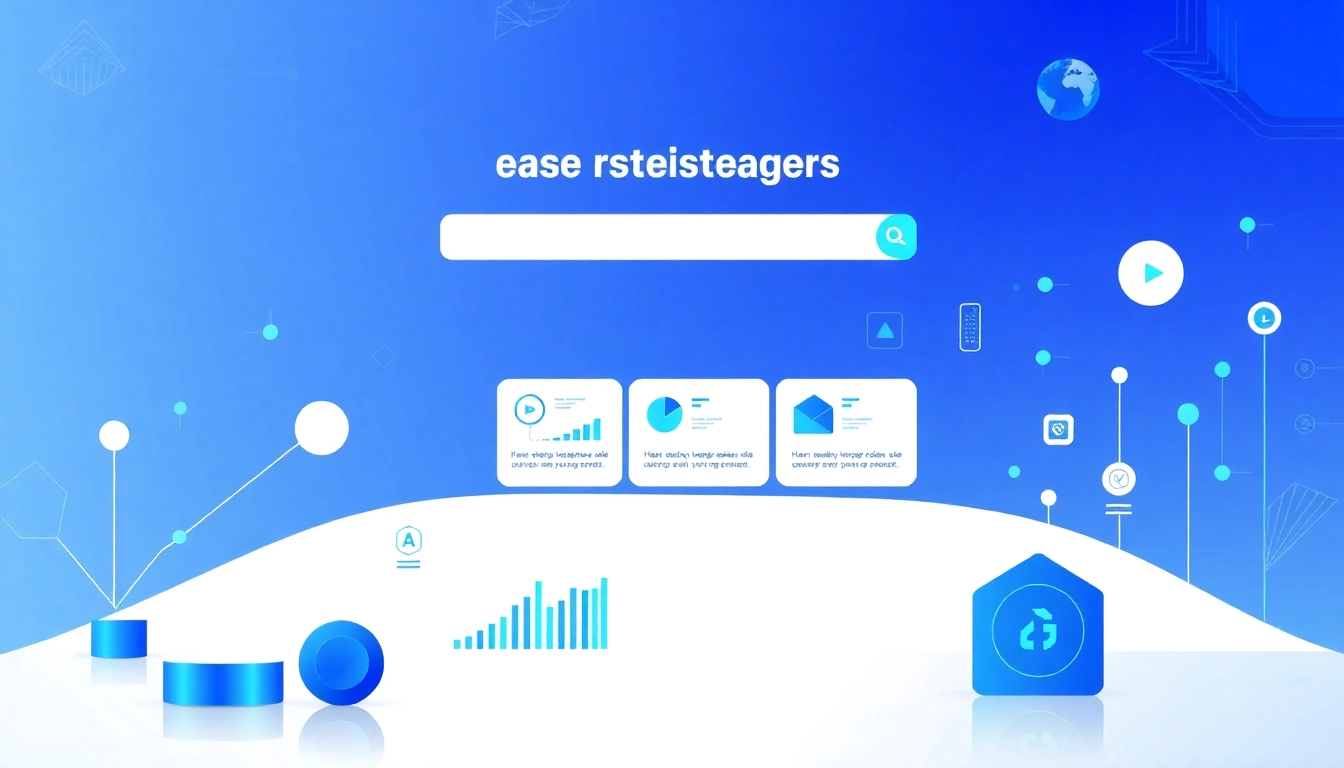Introduction to AI Search
Artificial Intelligence (AI) has dramatically reshaped the landscape of online search, providing users with more precise, contextual, and personalized search experiences. As we delve into the realm of AI search, it’s crucial to understand what this technology entails, its advantages, current trends affecting its evolution, and the various tools available in the market.
Understanding AI Search Technology
AI search refers to the application of artificial intelligence techniques to enhance search operations. Traditional search engines primarily rely on keyword matching and indexing algorithms, while AI search engines utilize machine learning, natural language processing, and semantic analysis to deliver results that are not just relevant but also insightful and context-aware.
The core of AI search technology is its ability to understand intentions behind queries rather than just matching strings of text. For instance, advanced AI search tools can comprehend complex questions, infer meanings, and analyze user behavior to provide tailored answers, significantly improving user experience.
Benefits of Using AI for Search Queries
The integration of AI into search algorithms offers several advantages:
- Enhanced Relevance: AI algorithms assess user intent and context, leading to more relevant search results that align with user needs.
- Natural Language Understanding: AI can process and understand conversational queries, allowing for more intuitive interaction with search engines.
- Personalization: AI-driven search platforms learn from user interaction patterns, compiling preferences that enable highly personalized search experiences.
- Speed and Efficiency: AI systems can analyze vast amounts of data rapidly, providing timely results that better serve user queries.
- Predictive Results: AI algorithms can anticipate user needs based on historical data, answering questions even before they are fully articulated.
Current Trends in AI Search Tools
Several trends are shaping the future of AI search:
- Multimodal Search: The blending of text, voice, and image searching, where users can input queries in various formats and receive integrated results.
- Generative AI: Platforms like ChatGPT and Google’s Gemini exemplify the trend toward generative models that can synthesize and generate information based on user queries.
- Emphasis on User Experience: AI tools prioritize user experience by facilitating easy navigation, efficient results display, and comprehensive search capabilities.
Popular AI Search Engines
Reviews of Leading AI Search Platforms
A plethora of AI search engines have emerged, each with its unique features and strengths. Here’s a look at some of the leading platforms available:
1. Google AI Search
Google continues to be a dominant force in AI-driven search through initiatives like its Gemini. Gemini offers advancements in understanding context and sentiment, enabling users to engage in more nuanced inquiries.
2. Bing AI
Bing’s integration with Microsoft’s Copilot has significantly improved its search capabilities, leveraging extensive data to offer superior results and personalized recommendations.
3. ChatGPT Search
OpenAI’s ChatGPT has transformed how search queries can be processed, offering conversational interactions and retrieving accurate data in real-time. This platform is particularly unique in how it synthesizes information contextually rather than merely pulling from existing databases.
4. Perplexity
Perplexity is another emerging player, designed to enhance the user experience by refining its ability to parse complex queries and respond with comprehensive answers, often backed with pages of references.
Comparing Features and Usability
When exploring AI search engines, it’s important to evaluate various features that influence usability:
- Interface Design: A clean, intuitive interface makes searches simpler and accessibility better.
- Response Accuracy: The ability of the platform to deliver reliable and relevant information is crucial for user trust.
- Support for Various Input Types: Platforms that facilitate text, voice, and visual inputs broaden usage scenarios.
- Integration with Other Tools: Compatibility with productivity applications and devices enhances the overall utility of search engines.
Case Studies: Success in AI Search
Examining successful implementations of AI search can provide insights into best practices:
Case Study 1: Google’s Quantum AI
Google’s Quantum AI project illustrates how leveraging AI can optimize search performance in extensive databases and improve processing time. By reducing error rates significantly, users experience enhanced accuracy in results.
Case Study 2: Microsoft Bing’s AI Integration
Microsoft’s collaboration between Bing and AI technologies has led to a marked increase in engagement, as users now receive contextually rich answers that help them make informed decisions, from product searches to travel planning.
Using AI Search Effectively
Best Practices for Optimizing Your Search
To maximize the benefits of AI search, consider the following best practices:
- Use Specific Queries: Being precise in your search terms helps the AI understand your query context and return more accurate results.
- Engage with the Platform: Using advanced features like filters and queries can lead to improved search results.
- Monitor and Adjust: Pay attention to the results generated and modify your queries based on received data for continual learning and optimization.
Strategies for Personalizing AI Search Results
To enhance personalized results, consider the following strategies:
- Account Customization: Ensure that you’re logged in while searching so that the AI can tailor results based on your previous interactions.
- Feedback on Results: Providing feedback on search results can inform the AI about what worked and what didn’t, refining future outputs.
- Utilize User Profiles: Many platforms allow user profile customization, where preferences and past searches can influence future results.
Common Pitfalls to Avoid with AI Search
While AI search holds immense potential, users should be aware of common pitfalls that can hinder their experience:
- Over-Reliance on AI: While AI offers powerful tools, critical thinking and verification are still essential in evaluating information.
- Ignoring Context: Not framing your queries with sufficient context can lead to misinterpretation by AI, resulting in irrelevant answers.
- Underutilizing Features: Failing to explore advanced search features limits the potential benefits that these AI systems offer.
Future of AI in Search
Innovations on the Horizon
The future of AI search is likely to witness groundbreaking innovations:
- Deep Learning Enhancements: Advances in deep learning will lead to more sophisticated algorithms capable of better predicting user intent and preferences.
- Extended Multimodal Capabilities: Future AI searches will seamlessly integrate voice, text, and visual inputs, allowing for comprehensive inquiry contexts.
- Decentralization of Search: Emerging trends showcase a move towards decentralized search models, prioritizing user ownership and data control.
Predicted Impact of AI on Search Behavior
As AI search technologies evolve, user behaviors are expected to shift significantly:
- Increased Expectation for Personalization: Users will increasingly expect tailor-made search results that consider their past behavior and choices.
- More Conversational Interaction: The expectation of engaging with search engines in a conversational manner will drive innovation in natural language processing.
- Demand for Visual and Voice Searches: With advancing technology, users will gravitate more towards voice and image searches, necessitating changes in AI search methodologies.
How Businesses Can Adapt to AI Search
To effectively leverage the changes brought by AI, businesses should:
- Invest in AI Technologies: Allocating resources to adopt AI solutions that enhance search capabilities is essential for remaining competitive.
- Embrace Data Analytics: Understanding user behavior through data analytics can aid in tailoring offerings that align with search preferences.
- Focus on Content Optimization: Companies should optimize content for AI searches, ensuring relevance, accuracy, and accessibility of information.
Conclusion
Summarizing AI Search Benefits
AI search drastically improves the user experience through nuanced understanding, personalized responses, and rapid processing. As we transition into a more AI-centric future, harnessing these benefits will become increasingly crucial for businesses and individuals alike.
Final Thoughts on Embracing AI in Searching
Embracing AI in search is not just about adopting new technologies; it’s about rethinking how we retrieve and utilize information in an ever-evolving digital landscape. By harnessing AI, users can unlock the full potential of search tools, leading to enhanced learning and discovery.
Steps to Get Started with AI Search Solutions
Getting started with AI search involves:
- Evaluating Needs: Clearly define your requirements and expectations from AI search solutions.
- Testing Multiple Platforms: Explore various AI search engines to find the ones that best suit your needs.
- Continuous Learning: Stay informed about emerging trends and technologies in AI to adapt and refine your search practices.







Leave a Reply